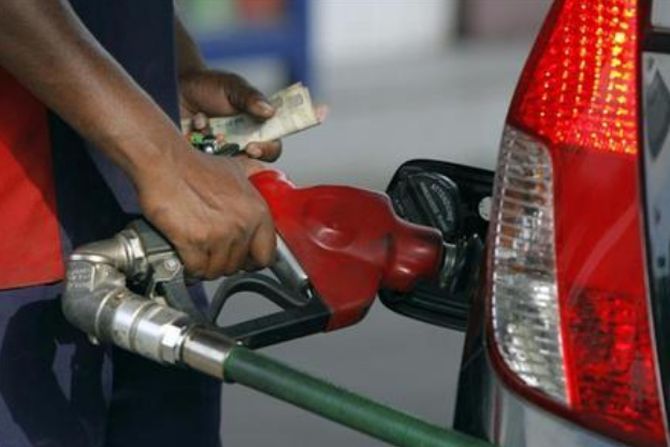State-owned refiners stand to gain from surging European demand for diesel as winter sets in and natural gas supplies from Russia are set to dwindle.
S Dinakar reports.

A looming global shortage of diesel in Europe presents India with more than one opportunity to profit from strong margins.
A shortage of the fuel, a key contributor to inflation, has been exacerbated by the conflict in Ukraine, and western sanctions on Russian fuel supplies.
The slowdown in natural gas supply means the West needs diesel to heat their homes this winter.
And India might have a solution to their problems — by exporting fuel to meet much of the continent’s needs.
Rising diesel prices also present an opportunity for India’s battered state oil refiners to salvage some of the losses they are incurring on selling transport fuels at government-administered rate for months.
“India is not only self-sufficient in diesel but also produces a surplus because it’s the biggest product from our refineries,” said M K Surana, CEO of Ratnagiri Refinery and Petrochemicals, which is pursuing India’s biggest refinery-cum-chemical plant in Maharashtra.
“Indian refineries are diesel-oriented,” Surana, a former chairman of HPCL, added.
“It’s an opportunity for India to export diesel to Europe,” said Prashant Vashisht, vice-president and co-head, corporate ratings, at Mumbai-based ICRA.
“Globally, refining capacity has been cut, and diesel use is less discretionary compared with, say petrol,” he added.
Europeans can choose not to run their vehicles but can ill afford to not heat their homes in winter.
“The diesel crack spreads are healthy, and have been elevated for many months now,” Vashisht added.
Record rates for both diesel and coal amid surging demand is a direct consequence of the sanctions on Russia, which was Europe’s biggest supplier of cheap natural gas, a fuel used to produce electricity and heat homes.
Diesel crack refers to the profits from converting crude oil to diesel.
But the financial gains from exporting fuels are mainly captured by Reliance Industries and Russian Rosneft-owned Nayara Energy.
India exported 465,000 barrels a day of diesel in the first half of this month, or, around a fifth of the country’s diesel output, with Reliance alone accounting for 401,000 barrels a day, according to data from London-based data analytics firm Vortexa and the oil ministry.
Last month, Reliance exported 376,000 barrels a day and Nayara 83,000 barrels a day of India’s total of 479,000 barrels a day in overseas sales of diesel.
Reliance and Nayara produce specific grades of diesel used in cold countries at advanced refineries in Gujarat, Vashisht said.
The Modi administration also stands to gain. Higher fuel exports will trim India’s surging trade deficit and improve New Delhi’s fiscal position.
A windfall tax on exports of oil products and on domestic crude from July may fetch an additional Rs 400 billion this fiscal, which can be used to compensate state oil refiners for some of the marketing losses, analysts said.
In the latest revision, the government cut the rate on overseas diesel sales to Rs 10.5 a litre from Rs 13 a litre.
The tax does not apply on exports of fuels from Reliance’s 35.2-million tonne Jamnagar refinery located in a SEZ in Gujarat, but only on overseas sales from its 33-million tonne domestic unit.
India’s focus over the decades on adding surplus refining capacity is finally paying dividends.
Indian refiners produced 65.5 million tonnes (MT) of diesel in the seven months of this fiscal, 43 per cent of all product output, according to oil ministry data.
But domestic consumption at only 48.4 MT during the period left nearly 17 MT, or 593,000 barrels a day, of diesel available for exports.
The surplus output accounts for a quarter of India’s diesel production. Production of all petroleum products grew by 8.1 per cent during the April-October 2022 period from a year earlier.
Refinery utilisation was over 100 per cent in the first half of this fiscal at 5.03 million barrels a day compared to 5.02 million barrels a day of capacity — with refiners such as Reliance Industries postponing maintenance programmes to supply Europe with fuels and capture the high cracks.
Diesel cracks were already strong prior to the Ukraine crisis as the world emerged from the pandemic.
They rose to records mid-year, months after Russia invaded Ukraine before moderating to around $40 a barrel now. High diesel cracks, which for Indian refiners contribute to the biggest chunk of margins derived from processing crude, have helped stanch overall losses in the second quarter.
For instance, Nomura said IOC’s adjusted Q2 FY23 EBITDA loss of Rs 88.4 billion was sharply lower than its original estimate of Rs 186 billion, mainly on account of higher gross refining margins (GRM) of $18.5 a barrel.
Discounted Russian crude has played a big role in keeping cracks of Indian refiners strong.
IOC’s GRM, which in the past have trailed Singapore refining margins, was at a premium of $10.4 per barrel over Singapore margins, benefitting from advantageous crude oil sourcing, after Russian crude grades traded at a discount of $24 per barrel to benchmark crudes last quarter.
India imported nearly 800,000 barrels a day of Russian grades this month, among India’s top three suppliers.
The conflict in Europe has exacerbated the crisis in the diesel market, which was already brewing since the pandemic, Vashisht said.
Blowout cracks in the global diesel market occurred in June this year, with the loss of Russian refining owing to operational outages, and product containment challenges has caused a diesel/gasoline hole greater than one million barrels a day that’s not easy to plug, Oslo-based Rystad Energy said.
“Like crude, refining faces stark underinvestment, exacerbated by closures and disruptions,” Goldman Sachs said in a report in late October.
“Distillates are the centre of scarcity, with stocks at unprecedentedly low levels.”
China’s large 100 million barrels issuance of product export quotas (likely over Q4FY22-H1FY23) will add meaningful distillate volumes (400,000 barrels a day) to the market.
Nevertheless, Q1FY23 still looks challenging, especially after January, when the EU-Russian product ban is implemented.
Goldman is referring to fresh strictures on supplies of Russian fuels from early February.
As a result, the bank revised upwards its 2023 distillate crack forecasts by +$6 per barrel.
With diesel, India can gain some goodwill from the West.
It withdrew decisions to export Covid-19 vaccines and wheat after facing a domestic crunch during the pandemic. That is unlikely to happen to diesel.











